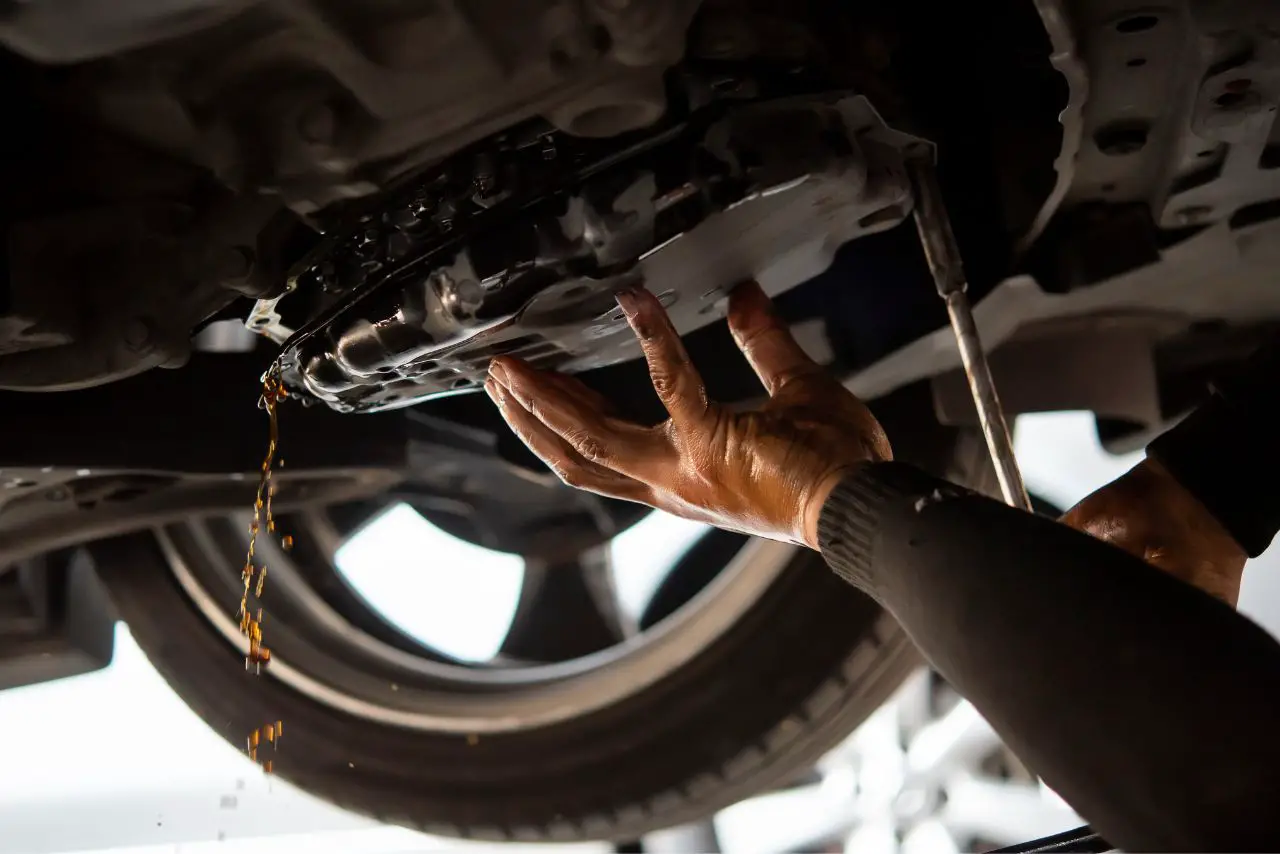Can a Bad Flywheel Cause Starting Problems? It is possible that a faulty flywheel could be the root cause of starting difficulties on an internal combustion engine.
The flywheel is a rotating mechanical device that connects the engine crankshaft to the clutch, and its primary function is to store rotational energy from the engine.
If there are any issues with the integrity of this part, then it may not be able to transfer enough torque for successful starting or result in insufficient compression due to misalignment of components.
If you’re experiencing starting problems with your vehicle, chances are you’re at a loss for what could be causing the issue.
There are several components involved in starting an engine, and troubleshooting which one is responsible can be like finding a needle in a haystack.
One component that often gets overlooked as a potential culprit is the flywheel. A bad flywheel can certainly cause starting problems, but many car owners aren’t even aware of what it does or how it works.
In this article, we’ll dive into all things flywheels and discuss how they operate in relation to your car’s engine.
We’ll also explore whether or not a bad flywheel could be behind your current starting issues, so read on to find out!
What Is The Flywheel?
The flywheel is an essential component of a vehicle’s engine that helps to regulate power and energy. It is a large, heavy disc that is typically attached to the rear end of the crankshaft and spins along with it.
The flywheel also provides a mounting surface for the clutch, which allows for engagement and disengagement from the transmission while driving.
In manual vehicles, it helps to smooth out speed changes by storing kinetic energy when the car accelerates and releasing it as needed when shifting gears or slowing down.
Can a Bad Flywheel Cause Starting Problems?
In General Yes, A bad flywheel can cause starting problems by making it difficult for the engine to turn over.
This is because the flywheel helps to store and release kinetic energy as the engine spins, and if it is not functioning properly, the engine may not be able to get the initial momentum it needs to start.
Additionally, if the flywheel is too worn or damaged, it may not be able to grip the clutch properly, which will prevent the engine from turning over at all.
What Are The Signs Of A Bad Flywheel?
As a vehicle owner, it’s important to be aware of the signs that indicate a bad flywheel. Here are some symptoms you should look out for:
- Difficulty starting the engine: A faulty flywheel can cause issues with starting the engine. You may have to turn the key several times before it finally starts.
- Grinding noise: If you hear a grinding noise when you start your vehicle or while driving, it could be due to damaged teeth on the flywheel causing difficulty in engaging with other components like clutch plate or starter motor.
- Burning smell: A worn-out flywheel can lead to excessive friction between the clutch plate and flywheel causing burning smells.
- Vibrations: If there is an uneven wear on the teeth of your vehicle’s flywheel, it can cause vibrations while driving which would make driving experience uncomfortable.
- Slipping gears: Since a flywheel helps maintain torque, if it is not functioning properly, you might notice slipping gears as well which would mean that your speed will drop dramatically without any apparent reason.
If you’re experiencing any of these symptoms, it’s crucial that you get your vehicle checked by a mechanic immediately as ignoring them could damage other engine components and cost more in repairs down the line.
Causes Of A Bad Flywheel:
A flywheel is an essential component of a vehicle’s engine that helps it run smoothly. When it comes to starting problems, a faulty flywheel could be the culprit. Let’s take a look at some common causes of a bad flywheel.
Worn Teeth: One of the most common issues with flywheels is worn teeth or cogs. These teeth engage with the starter motor to spin the engine and start the vehicle.
If they become damaged or worn down, the starter won’t be able to engage properly, causing difficulty in starting.
Cracked Flywheel: Another possible cause of a bad flywheel is cracks on its surface. The constant spinning and energy transfer can cause significant stress on this component leading to eventual damage.
A cracked flywheel may result in vibrations while driving, strange noises from your engine, or even complete failure of your transmission system.
Bent Flywheel: In rare cases, a bent flywheel could also cause starting problems for your vehicle.
This usually happens as a result of physical impact such as hitting something on the road or if you’ve been involved in an accident that caused structural damage to your car.
Worn Teeth:
One common cause of a bad flywheel is worn teeth, which can prevent the starter from properly engaging with the flywheel.
The teeth on the flywheel mesh with those on the starter motor when you turn the ignition key, allowing for proper engagement and starting of the engine.
Over time, these teeth may become worn down due to repeated use or improper installation of parts.
This can cause slipping or grinding noises when trying to start your vehicle and make it difficult or impossible to start without manual intervention.
Replacing a damaged flywheel with new one will help ensure that your vehicle runs smoothly and starts up properly without any issues caused by damaged parts.
Cracked Flywheel:
A cracked flywheel is a serious issue that requires immediate attention. It can cause a host of problems for your vehicle, including difficulty starting the engine and even prevent it from running altogether.
Symptoms of a cracked flywheel often include strange noises coming from the engine, vibrations while driving, and difficulties changing gears. You may also notice burning smells or feel a loss of power when driving.
A cracked flywheel can be caused by several factors, such as wear and tear over time or exposure to extreme temperatures. If left unrepaired, it could lead to more significant damage to other components in your vehicle’s engine.
In some cases, if caught early enough, small cracks in the flywheel can be welded shut. However, more extensive cracks usually require replacement of the entire component.
Overall, ignoring any issues with your vehicle’s flywheels could lead to costly repairs down the road.
Bent Flywheel:
A bent flywheel can be a serious issue and can cause starting problems in your vehicle. The flywheel is designed to provide a smooth surface for the clutch plate or torque converter to engage with, allowing the engine to smoothly transfer power to the transmission.
If the flywheel becomes bent, it will no longer spin properly, causing difficulty in starting your engine. This is because a bent flywheel can create vibrations that prevent the starter from engaging properly.
Additionally, a bent flywheel can cause damage to other components in your engine and transmission if left unaddressed.
To check for a bent flywheel, you should inspect it visually for any signs of warping or damage to its surface. You may also notice unusual noises or vibrations while driving that could indicate an issue with the flywheel.
How To Diagnose A Bad Flywheel?
If you’re experiencing difficulty starting your vehicle or hear strange noises when starting the engine, it could be a sign of a bad flywheel. Here are some steps to diagnose this issue:
- Check for unusual sounds: if you hear any grinding or scraping noises while trying to start your vehicle, it could signal that the teeth on the flywheel are damaged and not engaging properly with the starter.
- Inspect transmission plate: another way to diagnose a bad flywheel is by checking the transmission plate for signs of wear or damage. If there are visible cracks or chips in this plate, it may be due to stress caused by a faulty flywheel.
- Look for vibrations: if you feel shaking or vibrations while at low speeds, it could also indicate that your flywheel is damaged and needs replacement.
- Check clutch pedal resistance: try pressing down on the clutch pedal – if there’s little to no resistance, this might suggest that the transmission isn’t fully disengaging from the engine due to a bad flywheel.
- Pay attention to burning smells: sometimes, a burning smell can occur as a result of friction between two worn-out components such as a faulty flywheel and clutch assembly.
How To Repair Or Replace A Bad Flywheel?
Fixing a bad flywheel is crucial to getting your vehicle’s engine to start properly. Here’s how you can repair or replace a faulty flywheel:
Diagnose the issue:
Before repairing or replacing the flywheel, it’s essential to diagnose the problem correctly.
As discussed earlier, some symptoms of a bad flywheel are difficulty starting the vehicle, strange while driving, vibrations and burning smells.
Remove the transmission:
To access the flywheel position located behind it, remove the bolts from transmission first.
Inspect Flywheel:
Once you have removed the transmission and exposed the flywheel inspect it thoroughly for any signs of wear and tear such as cracks in surface areas or missing teeth on its gears.
Repair if possible:
If you caught any issues early enough before causing damage to other components like crankshaft or clutch plate that connects with it; then repairing would be less expensive comparative replacement.
Replacement:
If there is significant damage caused due to wear and tear that can’t be repaired easily then replacing with new one recommended by most mechanics because they ensure proper function through high-quality manufacturing processes.
It guarantees longer lifespan without creating similar problems again soon after installation completed smoothly.
How Much Does it Cost to Repair or Replace a Flywheel?
When it comes to repairing or replacing a faulty flywheel, the cost can vary depending on several factors. One of the main factors that determine the cost is whether you’re getting a repair or replaced Flywheel.
If your flywheel only needs repairing, it will cost less than buying and installing a completely new one.
Another important factor to consider is the make and model of your vehicle as well as the type of engine it has. The cost may also depend on how difficult it is to access and remove the flywheel.
On average, replacing a damaged flywheel can cost anywhere from $500 to $1,500 including parts and labor costs. However, this estimate can be higher for some luxury or high-performance vehicles.
Can A Bad Starter Damage A Flywheel?
A faulty starter can potentially damage a flywheel, which can cause starting problems. When the teeth of a starter do not engage properly with the teeth on the flywheel, it may cause grinding or clunking noises and difficulty in starting the vehicle.
This happens because the starter is unable to transfer power to crankshaft, causing issues with engine starting.
A damaged or worn-out flywheel may also prevent proper engagement between gears and cause issues like slipping clutch plate or difficult gear changes while driving a manual transmission vehicle.
Conclusion: Can a Bad Flywheel Cause Starting Problems?
Can a Bad Flywheel Cause Starting Problems? A bad flywheel can indeed cause starting problems in vehicles. The flywheel is an important component that helps the engine to start and run smoothly.
If the teeth on the flywheel have worn out or if it is cracked, bent, or damaged in any way, it could affect the ability of the starter to engage with the gears properly. This could result in difficulty starting your vehicle or even prevent it from starting at all.
It’s important to get flywheel checked by a mechanic if you suspect that there may be an issue. While sometimes it’s possible to repair a faulty flywheel, other times replacement may be necessary.
FAQs
What are the symptoms of a bad flywheel causing starting problems?
A bad flywheel can cause difficulty starting the engine, grinding or squealing noises during attempted starts, and unpleasant vibrations when the engine is running.
What is the cause of a bad flywheel causing starting problems?
A bad flywheel can cause starting problems due to wear and tear resulting in the flywheel becoming warped or damaged.
Is it possible to repair a bad flywheel?
Depending on the extent of the damage, a bad flywheel may be able to be repaired with resurfacing or a new flywheel may be necessary.
How can I prevent a bad flywheel causing starting problems?
Regularly inspecting the flywheel and replacing it when necessary can help prevent a bad flywheel causing starting problems.
What other problems can a bad flywheel cause?
In addition to causing starting problems, a bad flywheel can also cause the engine to run rough or misfire, or can cause damage to the starter motor or crankshaft.






Leave a Reply